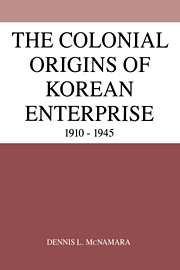7 - Kim and Industry
Published online by Cambridge University Press: 14 October 2009
Summary
Cho Ki-jun has held up Kim Yŏn-su and his Kyŏngsŏng Spinning as the preeminent example of national enterprise, a colonial venture representing more than just local ownership and management. Only local industrial entrepreneurship and the career of Kim remain to complete our story of dependent capitalism on the peninsula through 1945, and bring us to a conclusion about benign capitalism. One would hope local accumulation in a colony might provide capital for commercial or industrial reinvestment and a start toward indigenous development despite economic reliance on the metropole. But the task of attracting capital to local industrial and commercial ventures demands both organizations and symbols, structures and precedents, a “demonstration effect” of productive local enterprise: that is, indigenous banks, retailers, wholesalers, and light industries, plus confidence in their long-term viability. Consumers had been exposed to the quality and utility of Japanese manufactures flooding local markets. Now local consumers would be exposed to reliable, productive Korean manufacturers, retailers, and financiers. Such was the hope of the Native Products Campaign.
The Mins and Pak organized corporate structures and established precedents for productive local enterprise, but always by way of exception in a dependent situation. We can conclude this was “indigenous capital” insofar as they maintained local ownership and management for the most part.
- Type
- Chapter
- Information
- The Colonial Origins of Korean Enterprise1910–1945, pp. 102 - 121Publisher: Cambridge University PressPrint publication year: 1990



